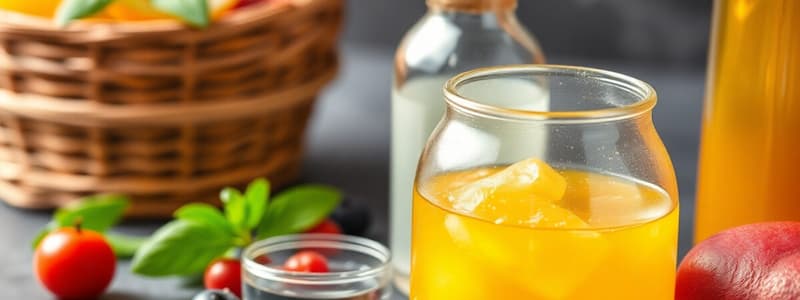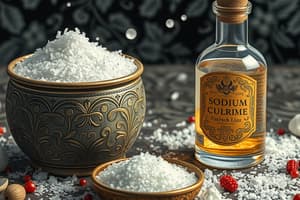Podcast
Questions and Answers
Which of the following best describes the structure-function relationships studied in food science?
Which of the following best describes the structure-function relationships studied in food science?
- How water, proteins, lipids, carbohydrates, minerals, and natural products behave in a food system. (correct)
- The interaction between different food processing techniques and consumer preferences.
- The economic impacts and market trends related to the food industry.
- The roles of various microorganisms in the synthesis of different food products.
What is the primary focus of studying food preservation methods in food science?
What is the primary focus of studying food preservation methods in food science?
- To examine techniques that extend shelf life and maintain food quality. (correct)
- To determine the economic impact of different preservation techniques.
- To enhance the nutritional aspects of foods through preservation.
- To observe consumer responses to various preservation methods.
Which of the following is NOT a primary component of food as a chemical system?
Which of the following is NOT a primary component of food as a chemical system?
- Lipids
- Enzymes (correct)
- Proteins
- Minerals
In a food science course, what would be the LEAST likely area of focus when evaluating the course content?
In a food science course, what would be the LEAST likely area of focus when evaluating the course content?
Which of the following is included in the curriculum for the Food Science seminar?
Which of the following is included in the curriculum for the Food Science seminar?
Flashcards
What is Food Science?
What is Food Science?
The study of food as a chemical system, including its composition, structure, and how it changes during processing and storage.
What are food preservation methods?
What are food preservation methods?
Methods used to extend the shelf life of foods and prevent spoilage. Examples include heating, freezing, drying, and using preservatives.
What are thermal preservation methods?
What are thermal preservation methods?
These methods involve applying heat to destroy microorganisms and enzymes that cause food spoilage.
What are non-thermal preservation methods?
What are non-thermal preservation methods?
Signup and view all the flashcards
What is the role of microorganisms in food science?
What is the role of microorganisms in food science?
Signup and view all the flashcards
Study Notes
Food Science Scope
- Food Science explores foods as chemical systems, focusing on structure-function relationships of water, proteins, lipids, carbohydrates, minerals, and natural products.
- Food safety and preservation methods are also crucial aspects.
Key Preservation Methods
- Students will learn about both thermal and non-thermal preservation methods.
Food Science Seminar Topics
- Seminar topics include Introduction to Food Science: Scope and Importance.
- Also covered are principles of food preservation, using thermal and non-thermal methods.
- A final topic is the role of microorganisms in food production and spoilage.
Food Composition
- Food's chemical composition includes water, proteins, lipids, carbohydrates, and minerals.
Course Evaluation
- The course evaluation includes a midterm (60 marks) and a final exam (40 marks).
- Other evaluation components include laboratory work, quizzes, reports, and projects.
Studying That Suits You
Use AI to generate personalized quizzes and flashcards to suit your learning preferences.




